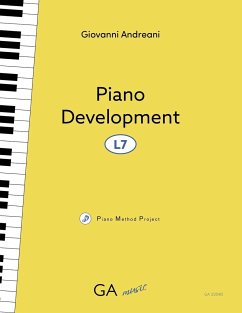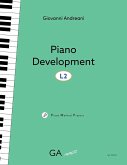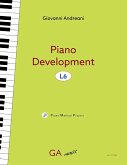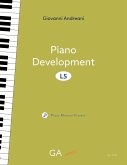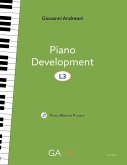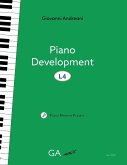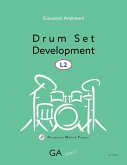Piano Development (PD) is, throughout the PMP Development Areas, the main framework around which all other Development Areas orbit; it has been conceived to help piano teachers achieve a profound view of their student's improvements while guiding them throughout the higher levels of piano playing. PD is divided into a first set of 20 levels and the student should be working on two different and consecutive levels at the same time. The general complexity expressed at each level of PD does not have to be comparable to the difficulty of other areas simultaneously studied, especially if related to repertoire. Indeed, the student may find him/herself studying a repertoire piece that is much more difficult than is expressed by the level required in PD. All pieces in this book will require the use of both hands playing simultaneously. The pieces are proposed in cicles of sets of five, and, while following one another, the texture will be perceived as gradually increasing in its thickness and complexity, by means af a gradual contrapunctual use of the musical lines and harmony involved. Each new set of pieces will begin with a rarefied texture, thus favouring the principle of diversification. By following the PMP principles the student will be working on PD L6 or PD L8 together with this level; in such a case the student will be dealing with a mixed set of pieces composed for two hands playing simultaneously as well as pieces for two hands performing one only melody (in the case of using PD L6 together with this book), or pieces exclusively for two hands playing simultaneously (in the case of using PD L8 together with this book). The introduction comprises directions for using this book, a description of all rhythmic patterns and time signatures found in the pieces and a description of the minimum prerequisites eventually needed for effectively starting this book. More specific directions for the teacher, related to a methodological approach to the pieces are also included; topics taken into consideration are: Preparation Improvisation Accidentals Hand positions Metronome Finding hand positions and improvising prior to practicing each piece Improvising chamber music Key signatures Moving to a new piece Moving to a new level Monitoring
Hinweis: Dieser Artikel kann nur an eine deutsche Lieferadresse ausgeliefert werden.
Hinweis: Dieser Artikel kann nur an eine deutsche Lieferadresse ausgeliefert werden.

